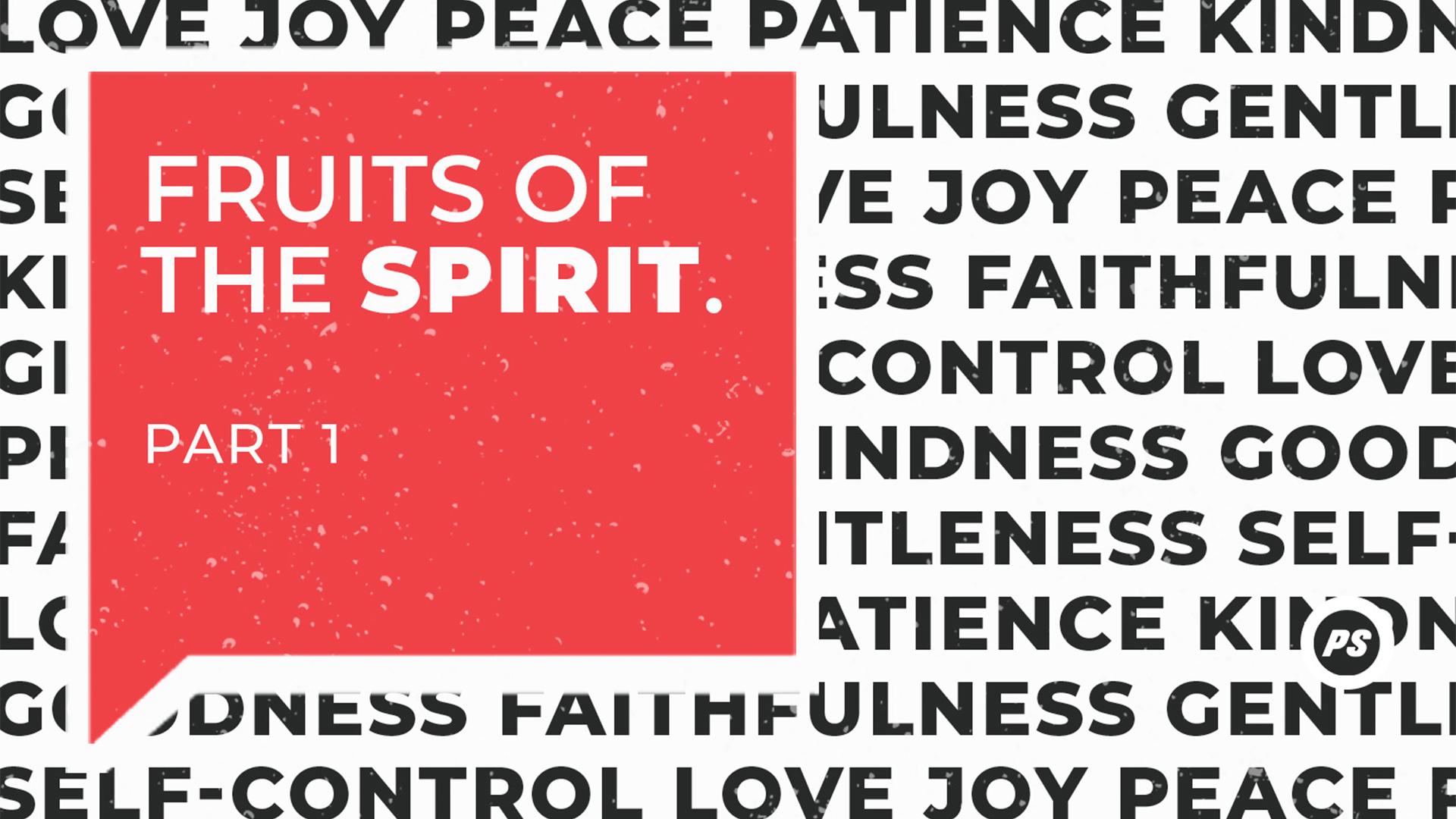But the fruit of the Spirit is love, joy, peace, patience, kindness, goodness, faithfulness, gentleness, self-control. Against such there is no law.
Who wouldn’t want more love, joy, peace, patience, kindness, goodness, faithfulness, gentleness and self-control in their life? I’m sure every Christian would agree that if we displayed these attributes consistently, we would be living a sanctified, Christ-like life— what should be our ultimate pursuit.
Most Chritsians are on this journey, but have a way to go in the quest for Christ-likeness. If I asked anyone (including myself) if they needed MORE of this fruit to be seen in their lives, I am certain that the answer would be an unequivocal, “Yes!” The truth is, the Fruit of the Spirit is exactly that—fruit of THE SPIRIT. It is unattainable without the Spirit and only He can produce it in our lives.
The truth is, the Fruit of the Spirit is exactly that—fruit of THE SPIRIT. It is unattainable without the Spirit and only He can produce it in our lives.
The Holy Spirit’s provision is one of the apostle Paul’s major themes throughout his New Testament writings. Romans 8:26 tells us that the Spirit helps us in our weakness. This is a free but invaluable gift! Any time this fruit is not visible in our lives, we begin to manifest the very opposite (impatience, anger, hostility etc.,) because our sinful nature (our weakness) is in control. It is only with Holy Spirit’s help that we can see these weaknesses diminish and His fruit multiply and grow. We simply cannot achieve this in our own strength! We will touch more on this idea throughout.
It is important to remember that the Fruit of the Spirit is not only given to us for our own benefit, enjoyment and satisfaction but as the book of Galatians demonstrates, is clearly designed to be directed toward other believers as well.
God made us relational, communal beings and intended that the Fruit of the Spirit we produce in our own lives, benefit everyone who comes into contact with it!
God made us relational, communal beings and intended that the Fruit of the Spirit that we produce in our own lives, benefit everyone who comes into contact with it!
There is a constant battle between our inherited sinful nature and living life ‘in the Spirit’.The two are completely opposed to each other! You’re either living in one of them or the other. There is no middle ground.
Why fruit?
A question I always ask myself when reading the Bible and one that often comes up during conversations with Planetshakers College students, is exactly why a certain passage shows up where it does. We know that the Bible was written by Plenary-Verbal Inspiration, meaning that it was written by man and inspired by God. So one way to discover what this passage was intended to mean is to read it in its original context. In this case, what exactly led to Paul writing this wonderful description exactly where he did and what can we learn from the verses leading up to it?
Overall Context: Galatians
First of all, the entire book of Galatians was written as a book of correction. One of my favourite verses is Galatians 3:1 which begins with, “O foolish Galatians”. Try reading this in a frustrated, angry voice! Essentially, a group known as the ‘Judaizers’—Jews who had received the Gospel but were adamant on continuing to follow the Old Testament law— were busy convincing the gentiles that being a Christian meant following many legalistic rules in their own strength in order to be holy and attain salvation. Does this sound familiar at all? Sometimes we try so hard in our own strength to be holy and prove ourselves worthy of salvation. How often do we read the Bible and try to mimic the character of Jesus through sheer force of will?
It is all well and good to try to be holy until we remember that we are sinful beings who have NO hope of doing any good in our own strength. Paul himself confirms this in Romans 7:15 when he says, “for I want to do what is right, but I don’t do it. Instead, I do what I hate”, and again in Romans 7:18 when he says, “I know that nothing good lives in me”. We witness his attempts to challenge the self-sufficient spirit of the Galatians in verses 3:2-3 where he marvels at their lack of belief, declaring, “After beginning by means of the Spirit, are you now trying to finish by means of the flesh?”.
We can see that Paul is trying to address the fact that there is no way to live a righteous life—a life that produces the Fruit of the Spirit— in our own strength. We NEED the Holy Spirit. The Galatians started well in living by the Spirit but then gradually fell back into relying on their own works rather than remaining in the Spirit.
Are there any areas in your life where you began your Christian walk ‘in the Spirit’ but have allowed the flesh to take over? I remember at a Planetshakers Conference a few years ago, the preacher posed this exact question. As I thought about this in the context of my own life, I truly believed that there were no such areas and I was fully dependent on the Holy Spirit. That was until I started experiencing a deep conviction and was led into a time of deeper encounter and reflection with Him. Turns out that there were several areas where I had drifted back into self-reliance that I needed to repent of. Sometimes you don’t even realise there are areas in your life that need surrendering back to God!
Nature vs Nurture
Let’s have a closer look at the verses surrounding our focus passage for today. Immediately preceding Galatians 5: 22-23, we find Paul talking about a battle between the flesh and the Spirit. Verse 17 says, “for the flesh desires what is contrary to the Spirit, and the Spirit what is contrary to the flesh. They are in conflict with each other so that you are not to do whatever you want.”
There is a constant battle between our inherited sinful nature (our flesh) and living life ‘in the Spirit. The two are completely opposed to each other! You’re either living in one of them or the other. There is no middle ground.
Living in the Spirit
There is some good news, however, in this great battle! Verse 16 says, “If we walk by the Spirit, we will not fulfil the desires of the flesh.” Great! So all we need to do is live by the Spirit— easy right?
Unfortunately, there is more to it than that. The Greek word, telos, used for ‘fulfil’ is the same word used when Jesus died on the cross and said, “It is finished.” This leaves us with the interpretation that If we live by the Spirit (with the help of the Spirit) then desires of the flesh will never be finished/satisfied/completed. Paul is not saying that sinful nature will not be present, or even that the aforementioned battle won’t exist. He is saying the flesh will never be fulfilled and always left wanting.
So living by the Spirit isn’t some magic ‘get-out-of-jail-free’ card that means we won’t experience temptation and feel the pulling of our flesh. Many people believe that living by the Spirit is a passive event that requires no effort on their part. In fact, while living by the Spirit is achieved entirely through Him, surrendering to the Spirit and remaining in Him takes a special type of diligence and perseverance. We have been called to a lifestyle of ‘living in the Spirit’ and not just a one-time decision.
While living by the Spirit is achieved entirely through Him, surrendering to the Spirit and remaining in Him takes a special type of diligence and perseverance. We have been called to a lifestyle of ‘living in the Spirit’ and not just a one-time decision.
Community
Before we move on to part 2 and put each Fruit of the Spirit under the microscope, I want to look at the communal aspect of this Fruit. We know how important building the local Church is to God, so the spiritual fruit that is manifest in our life should directly affect God’s people around us in a positive way— to assist in that building process.
Immediately preceding Paul’s list of the Fruits, is a list of the ‘works of the flesh’. You can read them in Galatians 5:17-22. While some try to categorise and define these works (sins), the main idea is that these sins affect others— particularly those in the community and local Church. Amongst others, these works include adultery, hatred and selfish ambition. At the time of Paul’s writing, these ‘sins’ were causing disarray in the community and were a result of the works of the flesh in action.
One of the reasons why the list of the Fruit of the Spirit is so beautiful, is because it is positioned directly after these works in the text. So why does Paul contrast fruit with works rather than works with works? Wouldn’t it make sense for Paul to say, “This is what living poorly looks like, which you guys are currently doing, and this is what living well looks like, which you guys can do if you live in the Spirit”? Instead, he doesn’t list what we can do to fix things, but what THE SPIRIT can do in us to enable the community and Church to reach their full potential as a congregation of believers.
The Amplified Version of Galatians 5:22 elaborates on the term fruit as, “the work which His presence within accomplishes.” The Fruit of the Spirit has nothing to do with us and everything to do with Him. All we need to do is let the Spirit do His work in us and the fruit will manifest.
On to the Fruit: Love
Part one of this series ends the way the Fruit of the Spirit starts— with LOVE. The word fruit is not plural, it is one singular fruit with many different outworkings (just as white light is one beam that contains a spectrum of several different individual colours). This is important because in this context, this one light beam is love. All of the other fruits flow out of love itself and make up its corporate expression. Without love, there can be no other fruit as they all depend on it. How easy is it to be patient with someone without love? How can goodness exist without love? Let’s not forget that the Fruit of the Spirit contains all of the individual qualities of becoming more ‘Christlike’. If we’re living in love, the other fruits should also be seen in our lives and are evidence that the Holy Spirit is doing His work!
More post from College





